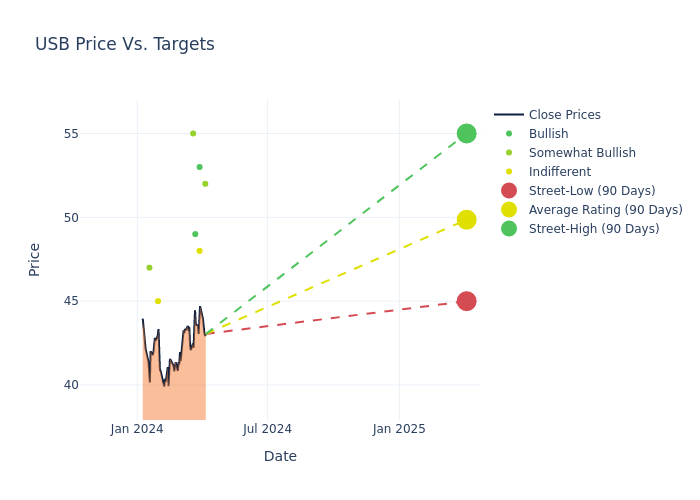Providing a diverse range of perspectives from bullish to bearish, 9 analysts have published ratings on U.S. Bancorp USB in the last three months.
The following table encapsulates their recent ratings, offering a glimpse into the evolving sentiments over the past 30 days and comparing them to the preceding months.
| Bullish | Somewhat Bullish | Indifferent | Somewhat Bearish | Bearish | |
|---|---|---|---|---|---|
| Total Ratings | 2 | 5 | 2 | 0 | 0 |
| Last 30D | 0 | 1 | 0 | 0 | 0 |
| 1M Ago | 2 | 1 | 1 | 0 | 0 |
| 2M Ago | 0 | 0 | 0 | 0 | 0 |
| 3M Ago | 0 | 3 | 1 | 0 | 0 |
In the assessment of 12-month price targets, analysts unveil insights for U.S. Bancorp, presenting an average target of $52.11, a high estimate of $61.00, and a low estimate of $45.00. Witnessing a positive shift, the current average has risen by 2.84% from the previous average price target of $50.67.

Exploring Analyst Ratings: An In-Depth Overview
In examining recent analyst actions, we gain insights into how financial experts perceive U.S. Bancorp. The following summary outlines key analysts, their recent evaluations, and adjustments to ratings and price targets.
| Analyst | Analyst Firm | Action Taken | Rating | Current Price Target | Prior Price Target |
|---|---|---|---|---|---|
| David Konrad | Keefe, Bruyette & Woods | Raises | Outperform | $52.00 | $50.00 |
| Vijay Kumar | Evercore ISI Group | Raises | In-Line | $48.00 | $46.00 |
| Saul Martinez | HSBC | Raises | Buy | $53.00 | $47.00 |
| David Rochester | Compass Point | Raises | Buy | $49.00 | $46.00 |
| Chris Kotowski | Oppenheimer | Lowers | Outperform | $55.00 | $61.00 |
| Chris Kotowski | Oppenheimer | Raises | Outperform | $61.00 | $59.00 |
| Betsy Graseck | Morgan Stanley | Raises | Equal-Weight | $45.00 | $44.00 |
| Gerard Cassidy | RBC Capital | Raises | Outperform | $47.00 | $43.00 |
| Chris Kotowski | Oppenheimer | Lowers | Outperform | $59.00 | $60.00 |
Key Insights:
- Action Taken: Analysts adapt their recommendations to changing market conditions and company performance. Whether they 'Maintain', 'Raise' or 'Lower' their stance, it reflects their response to recent developments related to U.S. Bancorp. This information provides a snapshot of how analysts perceive the current state of the company.
- Rating: Offering insights into predictions, analysts assign qualitative values, from 'Outperform' to 'Underperform'. These ratings convey expectations for the relative performance of U.S. Bancorp compared to the broader market.
- Price Targets: Analysts set price targets as an estimate of a stock's future value. Comparing the current and prior price targets provides insight into how analysts' expectations have changed over time. This information can be valuable for investors seeking to understand consensus views on the stock's potential future performance.
Navigating through these analyst evaluations alongside other financial indicators can contribute to a holistic understanding of U.S. Bancorp's market standing. Stay informed and make data-driven decisions with our Ratings Table.
Stay up to date on U.S. Bancorp analyst ratings.
Unveiling the Story Behind U.S. Bancorp
As a diversified financial-services provider, U.S. Bancorp is one of the nation's largest regional banks, with branches in roughly 26 states, primarily in the Western and Midwestern United States. The bank offers many services, including retail banking, commercial banking, trust and wealth services, credit cards, mortgages, and other payments capabilities.
A Deep Dive into U.S. Bancorp's Financials
Market Capitalization Analysis: Below industry benchmarks, the company's market capitalization reflects a smaller scale relative to peers. This could be attributed to factors such as growth expectations or operational capacity.
Revenue Growth: U.S. Bancorp's revenue growth over a period of 3 months has been noteworthy. As of 31 December, 2023, the company achieved a revenue growth rate of approximately 6.23%. This indicates a substantial increase in the company's top-line earnings. When compared to others in the Financials sector, the company faces challenges, achieving a growth rate lower than the average among peers.
Net Margin: U.S. Bancorp's net margin is below industry averages, indicating potential challenges in maintaining strong profitability. With a net margin of 11.38%, the company may face hurdles in effective cost management.
Return on Equity (ROE): U.S. Bancorp's ROE lags behind industry averages, suggesting challenges in maximizing returns on equity capital. With an ROE of 1.62%, the company may face hurdles in achieving optimal financial performance.
Return on Assets (ROA): U.S. Bancorp's ROA is below industry standards, pointing towards difficulties in efficiently utilizing assets. With an ROA of 0.12%, the company may encounter challenges in delivering satisfactory returns from its assets.
Debt Management: U.S. Bancorp's debt-to-equity ratio is below industry norms, indicating a sound financial structure with a ratio of 1.3.
The Basics of Analyst Ratings
Analysts work in banking and financial systems and typically specialize in reporting for stocks or defined sectors. Analysts may attend company conference calls and meetings, research company financial statements, and communicate with insiders to publish "analyst ratings" for stocks. Analysts typically rate each stock once per quarter.
Some analysts will also offer forecasts for metrics like growth estimates, earnings, and revenue to provide further guidance on stocks. Investors who use analyst ratings should note that this specialized advice comes from humans and may be subject to error.
This article was generated by Benzinga's automated content engine and reviewed by an editor.
© 2025 Benzinga.com. Benzinga does not provide investment advice. All rights reserved.
date | ticker | name | Price Target | Upside/Downside | Recommendation | Firm |
|---|
Trade confidently with insights and alerts from analyst ratings, free reports and breaking news that affects the stocks you care about.